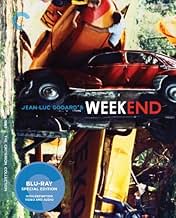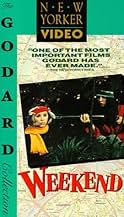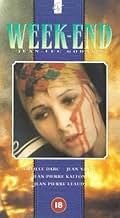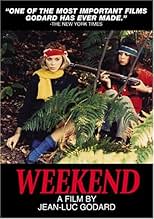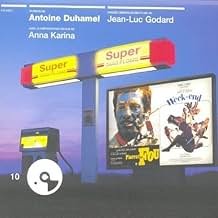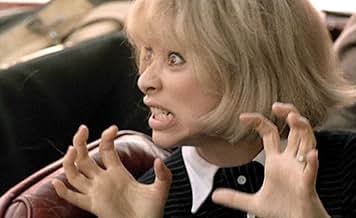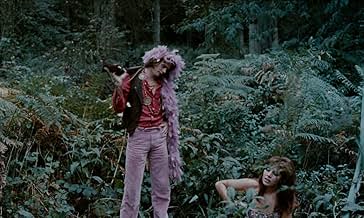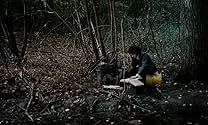IMDb-BEWERTUNG
6,9/10
16.400
IHRE BEWERTUNG
Die surreale Geschichte eines verheirateten Paares, das mit dem Auto zu den Eltern der Ehefrau fährt, um diese wegen des Erbes zu töten.Die surreale Geschichte eines verheirateten Paares, das mit dem Auto zu den Eltern der Ehefrau fährt, um diese wegen des Erbes zu töten.Die surreale Geschichte eines verheirateten Paares, das mit dem Auto zu den Eltern der Ehefrau fährt, um diese wegen des Erbes zu töten.
- Regie
- Drehbuch
- Hauptbesetzung
- Auszeichnungen
- 1 Gewinn & 4 Nominierungen insgesamt
Yves Afonso
- Gros Poucet
- (Nicht genannt)
Yves Beneyton
- Un membre du FLSO
- (Nicht genannt)
Juliet Berto
- Une activiste du FLSO
- (Nicht genannt)
- …
Michèle Breton
- Girl in the woods
- (Nicht genannt)
Michel Cournot
- Man From Farmyard
- (Nicht genannt)
Lex De Bruijn
- Revolutionary
- (Nicht genannt)
Jean Eustache
- L'auto-stoppeur
- (Nicht genannt)
Jean-Claude Guilbert
- Le clochard
- (Nicht genannt)
Paul Gégauff
- Le pianiste
- (Nicht genannt)
Blandine Jeanson
- Emily Bronte
- (Nicht genannt)
Louis Jojot
- Monsieur Jojot
- (Nicht genannt)
Valérie Lagrange
- La femme du chef du FLSO
- (Nicht genannt)
Jean-Pierre Léaud
- Saint-Just
- (Nicht genannt)
- …
Ernest Menzer
- Ernest - le cuisinier
- (Nicht genannt)
- …
Sanvi Panou
- Mon frère africain
- (Nicht genannt)
Empfohlene Bewertungen
I have a lot of problems with Godard's movies. I don't dispute that he is one of the great innovators of modern film making and 'Breathless' is certainly one of the few movies that changed cinema forever. But I don't really ENJOY watching 'Breathless' all that much , 'Bande a part' mostly bored me stupid , and 'Alphaville' is interesting for the most part but not exactly the most entertaining movie ever made... 'Week End' however is one of the few Godard movies I actually watch and LIKE and recommend. For most people it is one of his most difficult movies but I didn't find that to be the case. Anyone who enjoys surreal movies like those of Bunuel ('The Exterminating Angel' is name-dropped in 'Week End') or David Lynch or Peter Greenaway's underrated gem 'The Falls', or even vintage Monty Python will find this movie utterly fascinating. Corinne (Mireille Darc) and Roland (Jean Yanne) are two awful characters, almost proto-yuppies, who go on a drive to the country to weedle some money out of Corinne's parents. They immediately find themselves caught in a nightmarish traffic jam, and after that the movie get progressively weirder. Someone (I think it's Roland) says "this movie is rotten. All we meet are insane characters" (I'm paraphrasing). And that about nails it. We see Emily Bronte and fictional characters interact with Corinne and Roland, rape, murder, violence, revolution and all kinds of strangeness. The movie was released in 1967, best know as the Summer Of Love and the height of flower power, but Godard anticipates the darkness and despair of 1968 and 1969 when The Stones sang "the time is right for bloody revolution", The Stooges "1969 okay, war across the USA", The Doors "we want the world and we want it now!". 'Week End' is the anarchic side of the 1960s, not the peace'n'love'n' Woodstock 1960s. In many ways the movie is years ahead of its time anticipating (as did 'Alphaville') postmodernism. It can be difficult viewing at times, sometimes a bit frustrating if you prefer a conventional narrative, but I really really like it, and there's just nothing quite like it anywhere. If I was going to put some 1960s movies in a time capsule for future generations I would include 'Week End' alongside 'A Hard Day's Night', 'The Trip', 'Blow Up', 'Faster Pussycat! Kill! Kill!', 'Easy Rider', 'If...', 'Psycho', 'El Topo', 'Performance' and one or two others. Highly recommended inspired anarchic weirdness!
'Week End' is a poor attempt to mix highbrow political attacks with a lowbrow sensibility from one of cinema's great artists. Here we have Jean-Luc Godard at both his most political, and his most experimental, throwing together ideas about Marxism, cannibalism and consumerism, and not caring one little bit whether or not the audience understands his angle of attack, or even his reason for it. Beginning the film with juvenile captions like "a film adrift in the cosmos" and "a film found on a dump", 'Week End' desperately tries to set up a nonchalant attitude to politics, society and the role of the filmmaker, but instead, simply smacks of pretension.
Godard's early movies demonstrated both a love and understanding for the medium for which he both embraced and reinvented, at the same time producing a number of classic films. However, sometime during the mid-sixties Godard became less interested in linear storytelling, and more concerned with empty provocation, which is illustrated clearly in 'Week End'. The disjointed, often rambling 'plot' follows a young Parisian couple, Roland and Corrine. Both at the height of the swinging-sixties revolution -- they openly have affairs, and delight in telling each other about their seedy escapades in sordid detail. When sex isn't motivating them, money is, or at least the prospect of money. So much so, when the chance arrives to visit Corrine's dying father, they plot to finish the old man off, and then reap the benefits of the inheritance. An odious act you might say, but up until this point the film has been quite interesting, almost enjoyable, showing us a very witty deconstruction of our preconceptions of the modern Parisian couple. But as the pair hit the road, Godard takes his message and proceeds to whack the viewer square in the face with it.
Beginning with the in/famous ten-minute tracking shot (following Roland and Corrine as the try desperately to negotiate a traffic jam on a county road), their journey takes them on an episodic odyssey that is supposed to represent a symbolic cleansing for the characters. As the film progresses they witness bizarre fairytale people who preach liberalistic nonsense, all manner of unexplained car crashes, raving lunatics and a band of terrorists. All this is supposed to strip away Roland and Corrine's bourgeois façade, making them pure human beings again. The message is blunt, unsubtle and heavy-handed, without the mindless consumerism of modern society, man and woman can function purely, as they where meant to. But despite Godard's self-confidence, it is unclear from the film where his own political allegiance lies. It would seem he feels strongly in favour of anti-commercialism/anti-consumerism, but his argument is fatuous -- and lacking sufficient and believable ammunition to back it up -- his only alternative to everyday modern life would seem to be joining a band of cannibalistic terrorists. Or maybe this was a metaphor for society's often-violent ways.
On a plus side, 'Week End' sees Godard at his most primitive, both stylistically and visually. He composes each frame with the brightest of colours, has his actors speaking monologues directly to camera, and then the aforementioned, long, unbroken tracking shots. Of course despite having an interesting quality, these stylistic flairs mean absolutely nothing. It's merely Godard's attempt to make the audience pay attention to what the characters are saying -- but since they are all speaking pure drivel it would seem to have been a bad move. By the time the film reaches its inevitable, ambiguous climax, the whole event becomes all the more tiresome. As Godard runs out of things to say (which is long after the film ceased to make sense of its ideas), he begins building up images of collective degradation and supposed black-comedy satire, neither of which work successfully... and I haven't even mentioned the acting yet.
The only decent performance you'll find that is even remotely worth watching (i.e. not entirely detestable a characterisation), is Jean-Pierre Léaud's double cameo as 'saint-just'/'singing man in phone box'. He is an extremely likable actor, familiar to audiences as the young Truffaut-alike in 'The 400 Blows'. Unlike the other cast members (with the exception of Mireille Darc as Corrine), he is clearly in sync with Godard's particular filmmaking style, and for a brief moment, makes the film almost enjoyable. I feel bad criticising Godard like this, he is a rare filmmaker, and one who has never been afraid to speak his ideas courageously -- demonstrated by the list of relevant issues here -- but they are just not communicated well enough. It's a great shame then that Godard had to make his film so heavy-handed in its ideals, and so excruciatingly slow in pace that it fails to work on any real, important level. A huge disappointment 2/5
Godard's early movies demonstrated both a love and understanding for the medium for which he both embraced and reinvented, at the same time producing a number of classic films. However, sometime during the mid-sixties Godard became less interested in linear storytelling, and more concerned with empty provocation, which is illustrated clearly in 'Week End'. The disjointed, often rambling 'plot' follows a young Parisian couple, Roland and Corrine. Both at the height of the swinging-sixties revolution -- they openly have affairs, and delight in telling each other about their seedy escapades in sordid detail. When sex isn't motivating them, money is, or at least the prospect of money. So much so, when the chance arrives to visit Corrine's dying father, they plot to finish the old man off, and then reap the benefits of the inheritance. An odious act you might say, but up until this point the film has been quite interesting, almost enjoyable, showing us a very witty deconstruction of our preconceptions of the modern Parisian couple. But as the pair hit the road, Godard takes his message and proceeds to whack the viewer square in the face with it.
Beginning with the in/famous ten-minute tracking shot (following Roland and Corrine as the try desperately to negotiate a traffic jam on a county road), their journey takes them on an episodic odyssey that is supposed to represent a symbolic cleansing for the characters. As the film progresses they witness bizarre fairytale people who preach liberalistic nonsense, all manner of unexplained car crashes, raving lunatics and a band of terrorists. All this is supposed to strip away Roland and Corrine's bourgeois façade, making them pure human beings again. The message is blunt, unsubtle and heavy-handed, without the mindless consumerism of modern society, man and woman can function purely, as they where meant to. But despite Godard's self-confidence, it is unclear from the film where his own political allegiance lies. It would seem he feels strongly in favour of anti-commercialism/anti-consumerism, but his argument is fatuous -- and lacking sufficient and believable ammunition to back it up -- his only alternative to everyday modern life would seem to be joining a band of cannibalistic terrorists. Or maybe this was a metaphor for society's often-violent ways.
On a plus side, 'Week End' sees Godard at his most primitive, both stylistically and visually. He composes each frame with the brightest of colours, has his actors speaking monologues directly to camera, and then the aforementioned, long, unbroken tracking shots. Of course despite having an interesting quality, these stylistic flairs mean absolutely nothing. It's merely Godard's attempt to make the audience pay attention to what the characters are saying -- but since they are all speaking pure drivel it would seem to have been a bad move. By the time the film reaches its inevitable, ambiguous climax, the whole event becomes all the more tiresome. As Godard runs out of things to say (which is long after the film ceased to make sense of its ideas), he begins building up images of collective degradation and supposed black-comedy satire, neither of which work successfully... and I haven't even mentioned the acting yet.
The only decent performance you'll find that is even remotely worth watching (i.e. not entirely detestable a characterisation), is Jean-Pierre Léaud's double cameo as 'saint-just'/'singing man in phone box'. He is an extremely likable actor, familiar to audiences as the young Truffaut-alike in 'The 400 Blows'. Unlike the other cast members (with the exception of Mireille Darc as Corrine), he is clearly in sync with Godard's particular filmmaking style, and for a brief moment, makes the film almost enjoyable. I feel bad criticising Godard like this, he is a rare filmmaker, and one who has never been afraid to speak his ideas courageously -- demonstrated by the list of relevant issues here -- but they are just not communicated well enough. It's a great shame then that Godard had to make his film so heavy-handed in its ideals, and so excruciatingly slow in pace that it fails to work on any real, important level. A huge disappointment 2/5
There are enough interesting devices employed in Week-end to make one regret its fatal flaws. The ten minute long tracking shot of the traffic jam near the film's beginning, which has elicited so much press, is indeed riveting. There are other moments of brilliance, such as the long circular pan at the piano recital. But the problems with Week-end eventually overpower these moments and one is left wondering why the film and its creator have such a reputation for greatness. Ultimately, Godard's quite valid points about the complacency of the bourgeoisie, the brutality of human nature and the false promises of philosophy, religion and art are undermined by his heavy-handedness. Did Godard really believe that it was necessary to give us scene after scene of people acting in the same craven way to make us understand? Did we really need the 15 minute-long revolutionary speech by the garbage collectors to be able to see his point? Even the implied cannibalism in the final scene is rendered impotent, as just a few minutes earlier, we are forced to watch the very real (and sickening) killing and butchery of a pig. This film, edited mercilessly, would have made a fascinating 45-minute short, and would've produced much more impact upon the viewer. Instead, we are left with this rambling, repetitious exercise in excess. If you intend to see Week-end, I recommend keeping a finger poised over your fast-forward button.
Yeah, it's super bizarre and it's probably Godard's strangest work (which is saying a lot) that I've seen, but I still couldn't look past the glaring flaws and just love the wonderfully surrealist images. The first hour or so of the film is pretty much perfect, combining a brutally random sense of violence with some delightfully weird fantasy images and a dark, dark sense of humour. The infamous ten minute long tracking shot of the traffic jam manages to remain entertaining throughout by linking a series of hilariously comic moments. I also especially liked the bit with the guy with the Porsche singing into a pay phone and the inexplicable appearance of Emily Brontë, who is dismissed as a fictional character and lit on fire. However, once Godard's political beliefs begin making their presence felt in an all too explicit and blatant manner, the film grinds to a halt. I was simply bored during the long monologues on America's foreign policy, which seemed a rather childish attempt by Godard to get his message across. The film never really recovers from this, as even the appearance of a group of cannibalistic revolutionaries can't bring back the same sense of black comedy that populated the first 2/3 of the film. Still, it's utterly brilliant for a majority of the time, and its bizarre images mask a mostly subtle and intelligent tirade against society and commercialism. Not for the faint-hearted, though.
10miloc
I gave this movie a 10 out of 10. I expect many people would feel hard-pressed to give it a 2 on the same scale, and I honestly wouldn't blame those who do. "Week End" is a machine built to provoke, and perhaps irritation as well as admiration can be a measure of such a machine's success.
For myself, I love it. It boils with anger, frustration, and insane energy. In one sense, it approaches film like the Cubists approached painting, breaking down images, ideas, characters and plot into startlingly photographed, almost geometric segments. But where the Cubists were to content to experiment with form Godard's instincts stay furiously political; it's as though an early Picasso had been commandeered and refitted by George Grosz.
Arrogance is not always a drawback, as rock and roll fans know-- and "Week End" is a terribly arrogant film. The director trashes every convention that he can think of. It's all thrown together-- music, dialogue, on-screen text, unvarnished political theory, frightening violence-- onto a bare hook of a plot: a young, apparently soulless couple go on a week-end trip in the middle of what appears to be the end of Western civilization. Without apologies Godard throws this mess on the table and asks the rest of us, "What have you got to match it?"
Sadly, not much. Cinema as an art has regressed rather than advanced since this film was released. (Godard himself stalled after "Week End.") Despite the rise of independently funded, non-Hollywood films in the past decade, no one seems ready to dare the sort of experimentation with what film could be that was begun in the 60s, and this is a sad thing. The films made by Godard at the height of his powers are all the more precious now. "Week End" is a document of a time when film mattered. It is an artifact, but it would only be dated if it had been surpassed. It does not rest in peace.
For myself, I love it. It boils with anger, frustration, and insane energy. In one sense, it approaches film like the Cubists approached painting, breaking down images, ideas, characters and plot into startlingly photographed, almost geometric segments. But where the Cubists were to content to experiment with form Godard's instincts stay furiously political; it's as though an early Picasso had been commandeered and refitted by George Grosz.
Arrogance is not always a drawback, as rock and roll fans know-- and "Week End" is a terribly arrogant film. The director trashes every convention that he can think of. It's all thrown together-- music, dialogue, on-screen text, unvarnished political theory, frightening violence-- onto a bare hook of a plot: a young, apparently soulless couple go on a week-end trip in the middle of what appears to be the end of Western civilization. Without apologies Godard throws this mess on the table and asks the rest of us, "What have you got to match it?"
Sadly, not much. Cinema as an art has regressed rather than advanced since this film was released. (Godard himself stalled after "Week End.") Despite the rise of independently funded, non-Hollywood films in the past decade, no one seems ready to dare the sort of experimentation with what film could be that was begun in the 60s, and this is a sad thing. The films made by Godard at the height of his powers are all the more precious now. "Week End" is a document of a time when film mattered. It is an artifact, but it would only be dated if it had been surpassed. It does not rest in peace.
Wusstest du schon
- WissenswertesThe tracking shot of the traffic jam was the longest tracking shot in the history of cinema at that point in time as it was 300 meters long.
- Alternative VersionenFor the original U.S. theatrical release, distributor Grove Press dubbed the monologues (the garbagemen's piece on black revolution and the hippie's "ocean" poem) into English, although the rest of the film was in the original French with subtitles. A short credits sequence was also appended to the end of the film.
- VerbindungenEdited into Bande-annonce de 'Week End' (1967)
Top-Auswahl
Melde dich zum Bewerten an und greife auf die Watchlist für personalisierte Empfehlungen zu.
- How long is Weekend?Powered by Alexa
Details
Box Office
- Budget
- 250.000 $ (geschätzt)
- Laufzeit
- 1 Std. 45 Min.(105 min)
- Sound-Mix
- Seitenverhältnis
- 1.66 : 1
Zu dieser Seite beitragen
Bearbeitung vorschlagen oder fehlenden Inhalt hinzufügen

